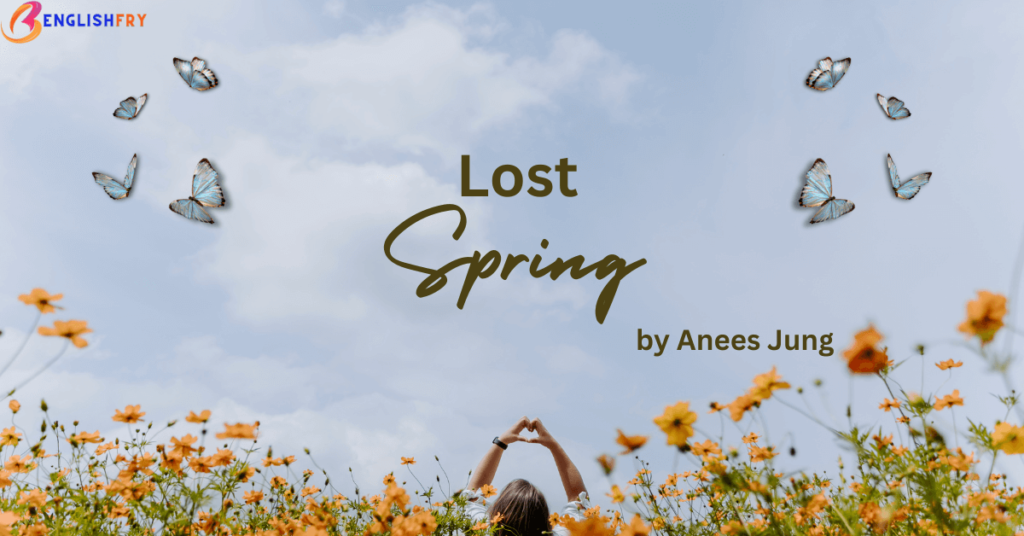Table of Contents
ToggleSummary of "Lost Spring"
So, here’s a summary of “Lost Spring.” It’s a story that sheds light on the tough lives of poor rag pickers and bangle-makers’ children. These unfortunate people migrated from Dhaka and settled in Seemapuri, where their homes and fields were destroyed by storms. They hoped for a better life in the big city, but things turned out to be really difficult for them. They face countless hardships because they lack resources and live in poverty.
Every morning, the writer observes a guy named Saheb rummaging through the neighborhood garbage, searching for something valuable. You see, these rag pickers survive by collecting valuable things from the trash. It’s quite fascinating for the kids who sometimes find a coin or two amidst all the rubbish. They have dreams and desires, but sadly, they don’t have the means to achieve them. There are many things they can’t even reach.
Then there’s Mukesh, who comes from a family of bangle-makers. Firozabad is known for its glass-blowing industry, where around 20,000 children work. Sadly, no one really cares about the law that bans child labor there. The living and working conditions for these children are dreadful. They live in gloomy rooms and work near scorching furnaces, which can impair their vision in the future. On top of that, they have to deal with debts and have no clue how to get out of this trap.
The authorities and even the women in their households believe it’s their fate, so they just go along with it. But Mukesh is different. He dreams big. He wants to be a motor mechanic, despite the garage being far away from where he lives. But he’s determined to walk the path towards his dreams.
In conclusion, “Lost Spring” highlights the harsh reality faced by many impoverished children. They endure pain, oppression, and a lack of education. It’s truly heart-wrenching to see their struggle for a better life.
Sometimes I find a rupee in garbage
The author examines and analyses the impoverished conditions and traditions that condemn children to a life of exploitation these children are denied an education and forced into hardships early in their lives.
The writer encounters Saheb – a rag picker whose parents have left behind the life of poverty in Dhaka to earn a living in Delhi. His family like many other families of rag pickers lives in Seemapuri. They do not have other identification other than a ration card.
The children do not go to school and they are excited at the prospect of finding a coin or even a ten rupee note for rummaging in the garbage.
It is the only way of earning. The writer is pained to see Saheb, a rag picker whose name means the ruler of earth, Lose the spark of childhood and roams barefooted with his friends. From morning to noon the author encounters him in a tea stall and is paid Rs. 800 He sadly realizes that he is no longer his own master and this loss of identity weighs heavily on his tender shoulders.
I want to drive a car
Mukesh Wants to be his Own Master
Here begins the second story. In Firozabad, the author meets Mukesh, who insists on being his own master. He wishes to be a motor mechanic. Anees asks him if he knows anything about cars. Mukesh replies that he wants to learn to drive a car.
The author feels that his dream is like a mirage amidst the dusty streets of Firozabad. Every second family in Firozabad is engaged in the business of bangle-making. Firozabad is the centre of India’s glass-blowing industry, where generations after generations have been involved in this business.
Another Encounter with Poverty
The people of Firozabad involve their children in the bangle-making industry without knowing that it is illegal for children to work in the glass furnaces with high temperatures, in dingy cells without air and light. If the -law is enforced, almost 20000 children would be out of the hot furnaces, where they work day and night, often losing the brightness of their eyes.
Mukesh proudly announces that his house is being rebuilt, and volunteers to take the author home. They walk down stinking lanes choked with garbage, past houses that are small and dirty constructions with wobbly doors and with no windows, where families of humans and animals co-exist in a primitive state.
They enter a half-built shack, one part of which is thatched with dead grass, where a frail young woman is cooking the evening meal for the whole family. She is the wife of Mukesh’s elder brother. Though not much older in years, she has the respect of a bahu. She veils her face when Mukesh’s father enters.
The God-given Lineage
Mukesh’s father has toiled hard all his life, first as a tailor and then as a bangle-maker. Still the poor fellow has been unable to renovate his house or send his two sons to school.
All he could manage to do was to teach them what he knows about the art of bangle-making. Mukesh’s grandmother has seen her husband go blind with the dust from polishing the glass bangles. She believes in destiny. “Can a God-given lineage ever be broken?” she implies. Born in the caste of bangle-makers, they have seen nothing but bangles-bangles of various colours.
Lost Spring
In dark hutments, next to lines of flames of flickering oil lamps, sit boys and girls with their fathers and mothers, welding pieces of coloured glass into circles of bangles. Their eyes are more adjusted to the dark than to the light outside. They often end up losing their eyesight before they become adults. The author notices a young girl, Savita, in a drab pink dress, sitting beside an elderly woman, helping in making bangles. Her hands move like a machine.
Anees wonders if she understands the sanctity of the bangles for Indian women. The sad irony will suddenly dawn upon her. She will become a bride like the old woman sitting beside her. In a voice drained of joy, the old lady tells the author that she has not enjoyed even one full meal in her entire lifetime.
Daring, Not a Part of Growing Up
One wonders if Mukesh’s father has achieved what many have failed to achieve in their lifetime. He has a roof over his head. The cry of not having money can be heard in every household of Firozabad. Nothing has changed over the years. Years of hardship have killed all hopes and dreams.
The author asks a group of young men to organise themselves in a cooperative. She learns the asks a group of men to in a horrific truth that even if they get organised, they are taken to jail for doing something illegal and are beaten up. There is no leader among them.
The author finds two distinct worlds in Firozabad. One is the exploited family caught in a vortex of poverty and the stigma of the caste in which they were born. The other is a vicious circle of those who exploit them, the sahukars, the middlemen, the politicians, the lawmakers, the policemen and the bureaucrats. These have created such a burden that a child accepts this as naturally as its father did. To do something else would mean to dare. And daring is not a part of growing up.
A Ray of Hope
The author is filled with joy when she finds that Mukesh thinks differently. The boy is filled with hope. His dream of being a motor-mechanic is still alive in his eyes.
He is willing to dare. Anees asks Mukesh if he also dreams of flying a plane. Mukesh replies in the negative. He is content to dream of cars, as few planes fly over Firozabad.
Conclusion of Lost Spring
Lost Spring summary gives us an analysis of the impoverished condition faced by many children that condemn them to a life of pain, oppression, and lack of education.
The Lost spring Summary in Hindi

पहला भाग गरीब कचरा बीनने वालों के जीवन के बारे में लेखक की धारणाओं को बताता है। कूड़ा बीनने वाले ढाका से आए हैं। इसके अलावा कूड़ा बीनने वालों की बस्ती सीमापुरी इलाके में है. तूफान के कारण उनके खेतों और घरों में तबाही आ गयी है. वे बड़े शहर में रहने की उम्मीद में आये थे। हालाँकि, वास्तविकता वास्तव में उनके लिए दर्दनाक थी और उन्हें कई कठिनाइयों का सामना करना पड़ा। वे निश्चित रूप से गरीब हैं और उनके पास विभिन्न संसाधनों का अभाव है। लेखक हर सुबह साहेब को पड़ोस में “सोना” खोजते हुए देखता है।
इन कूड़ा बीनने वालों की जीविका का साधन कूड़ा ही है। इसके अलावा, बच्चों के लिए तो यह एक अद्भुत चीज़ है। बच्चे उसमें से एक या दो सिक्के ढूंढ ही लेते हैं। इन लोगों की महत्वाकांक्षाएं और इच्छाएं होती हैं। समस्या यह है कि वे इन्हें संभव बनाने का तरीका नहीं जानते। ऐसी बहुत सी चीजें हैं जिन तक वे पहुंचने में असमर्थ हैं। बाद में साहेब एक चाय की दुकान से जुड़ जाते हैं जहां उनके लिए 800 रुपये और सारा खाना कमाने की संभावना होती है। हालाँकि, इस नौकरी ने उनसे उनकी आज़ादी छीन ली है।
ऐसे में उनकी स्थिति काफी निराशाजनक और दुख से भरी है। दूसरा भाग मुकेश के जीवन की पड़ताल करता है। मुकेश एक लड़का है जो चूड़ी बनाने वाले परिवार से है। फ़िरोज़ाबाद अपने अद्भुत कांच उड़ाने वाले उद्योग के लिए प्रसिद्ध है। इस विशेष व्यवसाय में लगभग 20,000 बच्चे जुड़े हुए हैं। इसके अलावा, वहां कोई भी बाल श्रम को प्रतिबंधित करने वाले कानून को नहीं समझता या उसका सम्मान नहीं करता। इसके अलावा, रहने की स्थिति और काम करने का माहौल दोनों ही भयावह हैं। ये बच्चे सुनसान कोठरियों में रहते हैं।
इसके अलावा, वे गर्म भट्टियों के करीब काम करते हैं। यह निश्चित रूप से बहुत खतरनाक है क्योंकि यह इन बच्चों को वयस्कता में प्रवेश करने पर अंधा बना देता है। इसके अलावा, इन बच्चों को कर्ज के दबाव से भी जूझना पड़ता है। इसके अलावा उन्हें इस समस्या के समाधान का कोई उपाय भी नहीं सूझ रहा है। इन बच्चों के पास इस जाल से निकलने का कोई रास्ता नहीं है. पुलिसकर्मी, नौकरशाह, बिचौलिए और राजनेता सभी उनकी प्रगति के रास्ते में बाधा डालेंगे। घर की महिलाएं इसे अपनी नियति या भाग्य मानती हैं।
ऐसी सोच के फलस्वरूप वे सिर्फ स्थापित परंपरा का पालन करते हैं। मुकेश में कुछ अलग बात है. वह वहां के बाकी लोगों की तरह नहीं है। ऐसा इसलिए क्योंकि मुकेश के सपने बड़े हैं. उनकी इच्छा भविष्य में मोटर मैकेनिक बनने की है। जहां वह रहता है वहां से गैराज बहुत दूर है लेकिन उसमें चलने का दृढ़ संकल्प है। लॉस्ट स्प्रिंग सारांश हमें कई बच्चों द्वारा सामना की गई गरीब स्थिति का विश्लेषण देता है जिसने उन्हें दर्द, उत्पीड़न और शिक्षा की कमी के जीवन की निंदा की।
The Lost spring Summary in Assamese

প্ৰথম খণ্ডত দুখীয়া চেলেং ছিঙি যোৱা লোকৰ জীৱন সম্পৰ্কে লেখকৰ অনুভৱৰ কথা কোৱা হৈছে। ঢাকাৰ পৰা আহিছে ৰেগ ছিঙি ফুৰা সকল। তদুপৰি, ছিমাপুৰী অঞ্চলত ৰেগ ছিঙি থকা সকলৰ বসতি। ধুমুহাৰ ফলত তেওঁলোকৰ পথাৰ আৰু ঘৰত ধ্বংস হৈছে। ডাঙৰ চহৰখনলৈ আহিছিল তাত বাসস্থান বিচাৰি পোৱাৰ আশাত। অৱশ্যে বাস্তৱতা আচলতে তেওঁলোকৰ বাবে বেদনাদায়ক আছিল আৰু তেওঁলোকে বহু কষ্টৰ সন্মুখীন হ’বলগীয়া হৈছিল। তেওঁলোক নিশ্চয় দৰিদ্ৰ আৰু বিভিন্ন সম্পদৰ অভাৱ।
লেখকে প্ৰতিদিনে পুৱা চাহেবক চাই থাকে যেতিয়া তেওঁ চুবুৰীত “সোণ” বিচাৰি খোজ কাঢ়িছে। এই চেগুন ছিঙি থকা লোকসকলৰ জীয়াই থকাৰ উপায় হ’ল জাবৰ। তদুপৰি ল’ৰা-ছোৱালীবোৰৰ বাবে ই এক আচৰিত কথা। ল’ৰা-ছোৱালীবোৰে তাৰ পৰা এটা বা দুটা মুদ্ৰা বিচাৰি উলিয়াবলৈ সক্ষম হয়। এই লোকসকলৰ উচ্চাকাংক্ষা আৰু ইচ্ছা আছে। সমস্যাটো হ’ল তেওঁলোকে সেইবোৰ সম্ভৱ কৰি তোলাৰ উপায় নাজানে। যথেষ্ট কেইটামান কথা তেওঁলোকে লাভ কৰিবলৈ অক্ষম।
পিছত চাহেবে চাহ ষ্টলত যোগদান কৰে য’ত তেওঁৰ বাবে ৮০০ টকা উপাৰ্জন কৰাৰ সম্ভাৱনা আৰু সকলো আহাৰ। অৱশ্যে এই চাকৰিটোৱে তেওঁৰ স্বাধীনতা বঞ্চিত কৰিছে। সেইবাবেই তেওঁলোকৰ অৱস্থা যথেষ্ট আশাহীন আৰু দুৰ্দশাৰে ভৰা। দ্বিতীয় খণ্ডত মুকেশৰ জীৱনৰ সন্ধান কৰা হৈছে। মুকেশ বেংগল-মেকাৰ পৰিয়ালৰ ল’ৰা। ফিৰোজাবাদ ইয়াৰ আচৰিত কাঁচ উৰুৱা উদ্যোগৰ বাবে বিখ্যাত। এই বিশেষ ব্যৱসায়ত প্ৰায় ২০ হাজাৰ শিশুৰ এংগেজমেণ্ট আছে।
তদুপৰি শিশু শ্ৰমিক নিষিদ্ধ কৰা আইনখন তাত কোনোৱেই বুজি নাপায় বা সন্মান নকৰে। তদুপৰি জীৱন-যাপনৰ অৱস্থাৰ লগতে কৰ্ম পৰিৱেশ দুয়োটাই ভয়ংকৰ। এই শিশুসকলে নিস্তব্ধ কোষত বাস কৰে। লগতে গৰম চুলাৰ ওচৰত কাম কৰে। এইটো নিশ্চিতভাৱে অতি বিপদজনক কাৰণ ইয়াৰ ফলত এই শিশুসকলে প্ৰাপ্তবয়স্ক জীৱনত ভৰি দিলে অন্ধ হৈ পৰে। তদুপৰি এই শিশুসকলে ঋণৰ চাপৰ সৈতে মোকাবিলা কৰিবলগীয়া হয়। তদুপৰি এই সমস্যা সমাধানৰ উপায় চিন্তা কৰিবলৈও অক্ষম।
এই ফান্দৰ পৰা এই ল’ৰা-ছোৱালীবোৰ ওলাই আহিব নোৱাৰে। আৰক্ষী, আমোলা, মধ্যভোগী, ৰাজনীতিবিদ সকলোৱে তেওঁলোকৰ অগ্ৰগতিৰ পথত বাধাৰ সৃষ্টি কৰিব। ঘৰৰ নাৰীসকলে ইয়াক নিজৰ ভাগ্য বা ভাগ্য বুলি গণ্য কৰে। এনে চিন্তাৰ ফলস্বৰূপে তেওঁলোকে কেৱল প্ৰতিষ্ঠিত পৰম্পৰা অনুসৰণ কৰে। মুকেশৰ মাজত কিবা এটা বেলেগ। তাত থকা বাকী লোকসকলৰ দৰে তেওঁ নহয়। কাৰণ মুকেশৰ ডাঙৰ ডাঙৰ সপোন আছে। ভৱিষ্যতে মটৰ মেকানিক হোৱাৰ হেঁপাহ তেওঁৰ।
তেওঁ থকা ঠাইৰ পৰা গেৰেজটো বহু দূৰত যদিও খোজ কাঢ়িবলৈ তেওঁৰ দৃঢ়তা আছে। হেৰুৱা বসন্তৰ সাৰাংশই আমাক বহু শিশুৱে সন্মুখীন হোৱা দৰিদ্ৰ অৱস্থাৰ বিশ্লেষণ দিয়ে যিয়ে তেওঁলোকক যন্ত্ৰণা, অত্যাচাৰ আৰু শিক্ষাৰ অভাৱৰ জীৱনলৈ নিন্দা কৰে।

Lost Spring Important Questions and Answers
1.What is Saheb looking for in the garbage dumps? Where is he and where has he come from?
Answer : Saheb is looking for any precious thing which he cannot afford to buy. Things like a rupee, silver coin or a pair of shoes. He has come to the garbage dump in the writer’s neighbourhood. He lives in Seemapuri in Delhi and has come from Dhaka.
2.What explanations does the author offer for the children not wearing footwear?
Answer : The author says that they do not wear footwear because it is a tradition in their families to remain barefoot.
3.Is Saheb happy working at the tea-stall? Explain.
Answer : Saheb is not happy working at the tea-stall as the author notices that his face has lost its carefree look, which makes it evident that he is not happy. He has also lost his independence, and is no longer his own master.
4.How is Mukesh’s attitude to his situation different from that of his family?
Answer : Mukesh dares to dream and has a way out of his situation. He aspires to become a motor mechanic. On the other hand, his family does not dare to dream. They are too tired and scared to do something to come out of their grim situation.
5. What could be some of the reasons for the migration of people from villages to cities?
Answer : People migrate from villages to cities in search of a better life. They want to earn money so that they can lead a good life and rear their children in a better way. As cities have more opportunities for work, this makes them migrate from the villages to these big cities.
6. What forces conspire to keep the workers in the bangle industry of Firozabad in poverty?
Answer : The writer tells us that the bangle – makers of Firozabad are poverty – stricken. They are burdened by the fact of the particular caste in which they are born – bangle – makers. They have to continue the traditional profession. Further, the society has formed a harsh circle around them. The money – lenders, middlemen, policemen, law – keepers, officers and politicians altogether form a barrier around them and tie them in the grip of poverty. They cannot escape from it.
7. How, in your opinion, can Mukesh realise his dream?
Answer : Mukesh dared to dream and wanted to become a motor mechanic. He wanted to drive cars too. He took the initial step by aspiring to do something different from the family business. I think that Mukesh can realize his dream with determination and hard work.
8. Mention the hazards of working in the glass bangles industry.
Answer : The poor bangle makers in Firozabad work in dangerous conditions. The furnaces have very high temperatures and no ventilation. Hence, they are prone to ailments like lung cancer. While polishing the bangles, the dust harms their eyes and many lose their vision. They remain in dark for long hours and so are unable to see during the daytime.

Lost Spring MCQ Questions with Answers
- Where was Anees Jung born and where did she spend her childhood and adolescence?
- a) Born in Hyderabad, spent childhood in Rourkela
- b) Born in Rourkela, spent childhood in Hyderabad
- c) Born in Delhi, spent childhood in Mumbai
- d) Born in Kolkata, spent childhood in Chennai
Correct Answer: b) Born in Rourkela, spent childhood in Hyderabad
- What was Anees Jung’s career trajectory before becoming a writer?
- a) Scientist
- b) Journalist and Editor
- c) Teacher
- d) Politician
Correct Answer: b) Journalist and Editor
- In the excerpt, what does Saheb say about finding money in the garbage dumps?
- a) “I sometimes find a rupee, even a ten-rupee note.”
- b) “I always find gold in the garbage.”
- c) “Money is scarce in the garbage.”
- d) “Finding money is not worth the effort.”
Correct Answer: a) “I sometimes find a rupee, even a ten-rupee note.”
- Why does Saheb scrounge in the garbage dumps every morning?
- a) He enjoys the search for valuables
- b) He is looking for food
- c) It is a tradition in his family
- d) He is searching for gold
Correct Answer: b) He is looking for food
- What did Saheb say when asked about going to school?
- a) “I go to school every day.”
- b) “I don’t like school.”
- c) “There is no school in my neighborhood.”
- d) “I have already finished school.”
Correct Answer: c) “There is no school in my neighborhood.”
- What does Saheb say when Anees Jung jokingly asks if he will come to school if she starts one?
- a) “No, I don’t like school.”
- b) “Maybe, if it’s close by.”
- c) “Yes,” he says, smiling broadly.
- d) “I prefer working.”
Correct Answer: c) “Yes,” he says, smiling broadly.
- According to Saheb, why does he scrounge in the garbage dumps?
- a) To find gold
- b) Because he enjoys it
- c) Because he has nothing else to do
- d) To sell the items he finds
Correct Answer: c) “I have nothing else to do.”
- What is the condition of Seemapuri, where Saheb’s family lives?
- a) A modern and well-developed city
- b) A wilderness with no identity
- c) A thriving cultural hub
- d) A historical town with monuments
Correct Answer: b) A wilderness with no identity
- What is the population of ragpickers living in Seemapuri?
- a) 5,000
- b) 10,000
- c) 15,000
- d) 20,000
Correct Answer: b) 10,000
- How long have the ragpickers lived in Seemapuri, and what do they lack?
- a) 20 years, lack identity
- b) 30 years, lack permits
- c) 40 years, lack sewage
- d) 50 years, lack running water
Correct Answer: b) 30 years, lack permits
- What is the significance of the ration cards for the ragpickers in Seemapuri?
- a) It allows them to travel freely
- b) It provides them with identity
- c) It enables them to buy grain
- d) It gives them access to healthcare
Correct Answer: c) It enables them to buy grain
- How does Saheb describe the act of finding money in the garbage?
- a) “It is a daily struggle.”
- b) “It is like finding gold.”
- c) “It is not worth the effort.”
- d) “It is meaningless.”
Correct Answer: b) “It is like finding gold.”
- What does Anees Jung wonder about the tradition of walking barefoot in some areas?
- a) Lack of money
- b) Lack of awareness
- c) Tradition or excuse for poverty
- d) Influence of foreign culture
Correct Answer: c) Tradition or excuse for poverty
- What does the man from Udipi pray for as a young boy?
- a) A pair of shoes
- b) A bicycle
- c) A good education
- d) A new house
Correct Answer: a) A pair of shoes
- How has the town of Firozabad been described in the excerpt?
- a) A cultural center
- b) Famous for its bangles
- c) A hub for education
- d) A thriving industrial town
Correct Answer: b) Famous for its bangles
- What is the occupation of Mukesh’s family in Firozabad?
- a) Farming
- b) Glass-blowing and making bangles
- c) Tailoring
- d) Teaching
Correct Answer: b) Glass-blowing and making bangles
- What does Mukesh want to become in the future?
- a) A bangle maker
- b) A tailor
- c) A motor mechanic
- d) A teacher
Correct Answer: c) A motor mechanic
18)How do the young men in Firozabad describe their predicament with middlemen?
- a) “The middlemen support us and treat us well.”
- b) “We are trapped by middlemen who exploit us.”
- c) “Middlemen provide us with opportunities.”
- d) “We have a cooperative relationship with middlemen.”
Correct Answer: b) “We are trapped by middlemen who exploit us.”
- What does Anees Jung suggest to the young men in Firozabad as a solution to their problems?
- a) Forming a cooperative
- b) Seeking government assistance
- c) Moving to a different town
- d) Ignoring the middlemen
Correct Answer: a) Forming a cooperative
- Why do the young men in Firozabad hesitate to organize themselves into a cooperative?
- a) Fear of police action
- b) Lack of funds
- c) Lack of leadership
- d) Belief in the current system
Correct Answer: a) Fear of police action

- What is the primary occupation of the families in Firozabad’s glass-blowing industry?
- a) Tailoring
- b) Making bangles
- c) Agriculture
- d) Carpentry
Correct Answer: b) Making bangles
- According to the excerpt, what does the art of making bangles symbolize for the families in Firozabad?
- a) Wealth
- b) Creativity
- c) Suffering
- d) Tradition
Correct Answer: d) Tradition
- How does the old woman with bangles on her wrist describe her life?
- a) Happy and content
- b) Filled with joy
- c) Full of regret and suffering
- d) Prosperous and successful
Correct Answer: c) Full of regret and suffering
- What is the elderly bangle maker’s response when asked about breaking the lineage of bangle making?
- a) “Yes, we should move away from this tradition.”
- b) “A god-given lineage can never be broken.”
- c) “We need to find alternative occupations.”
- d) “Bangle making is a dying art.”
Correct Answer: b) “A god-given lineage can never be broken.”
- How does the grandmother describe the caste they were born into in Firozabad?
- a) A blessing
- b) A burden
- c) A privilege
- d) An obstacle
Correct Answer: b) A burden
- What is Mukesh’s dream occupation in Firozabad?
- a) Glass-blowing artist
- b) Tailor
- c) Motor mechanic
- d) Farmer
Correct Answer: c) Motor mechanic
- How does Mukesh plan to learn his dream occupation?
- a) Attend school
- b) Join a cooperative
- c) Walk to a garage and learn
- d) Get a formal education
Correct Answer: c) Walk to a garage and learn
- What does Mukesh’s statement about wanting to drive a car reveal about his aspirations?
- a) He dreams of becoming a pilot.
- b) He wants to explore the world.
- c) He has modest dreams related to cars.
- d) He is not interested in driving.
Correct Answer: c) He has modest dreams related to cars.
- In the excerpt, what does Anees Jung observe about Mukesh’s eyes when he talks about his job?
- a) His eyes are filled with sadness.
- b) His eyes are bright and hopeful.
- c) His eyes show regret and disappointment.
- d) His eyes reflect contentment.
Correct Answer: a) His eyes are filled with sadness.
- According to Mukesh, what does he do for work in the tea stall?
- a) Sells tea
- b) Cooks meals
- c) Works as a waiter
- d) Cleans utensils
Correct Answer: a) Sells tea
- How does Saheb’s attitude change when he starts working at the tea stall?
- a) He becomes more carefree.
- b) He becomes his own master.
- c) He becomes wealthier.
- d) He becomes less content.
Correct Answer: b) He becomes his own master.
- What do Mukesh’s eyes reveal about his feelings when he talks about his job?
- a) Happiness and contentment
- b) Disappointment and regret
- c) Ambition and determination
- d) Suffering and despair
Correct Answer: b) Disappointment and regret
- What is Saheb’s response when asked about the tennis game he is watching?
- a) “I don’t like tennis.”
- b) “I wish I could play tennis.”
- c) “I go inside when no one is around.”
- d) “I am not interested in sports.”
Correct Answer: c) “I go inside when no one is around.”
- What does Saheb say about the tennis shoes he is wearing?
- a) “I bought them.”
- b) “Someone gave them to me.”
- c) “I found them in the garbage.”
- d) “I don’t like wearing shoes.”
Correct Answer: b) “Someone gave them to me.”
- What is Saheb’s reaction to the fact that the tennis shoes were discarded by a rich boy?
- a) He is disappointed.
- b) He doesn’t care about the origin.
- c) He refuses to wear them.
- d) He is grateful for any shoes.
Correct Answer: b) He doesn’t care about the origin.
- What does Saheb say about finding a silver coin in the garbage?
- a) “It is meaningless.”
- b) “It is like a treasure hunt.”
- c) “It makes me happy.”
- d) “It is a common occurrence.”
Correct Answer: c) “It makes me happy.”
- According to Anees Jung, what is the difference in perception between children and elders regarding garbage in the excerpt?
- a) Children see garbage as a source of wonder, while elders see it as a means of survival.
- b) Children find garbage meaningless, while elders consider it a valuable resource.
- c) Both children and elders view garbage as a burden.
- d) Children and elders have similar perspectives on garbage.
Correct Answer: a) Children see garbage as a source of wonder, while elders see it as a means of survival.
- What reason does Anees Jung give for children walking barefoot in some areas across the country?
- a) Lack of awareness
- b) Tradition or excuse for poverty
- c) Influence of foreign culture
- d) Economic necessity
Correct Answer: b) Tradition or excuse for poverty
- According to the excerpt, what do the bangles symbolize for Indian women?
- a) Wealth and status
- b) Marriage auspiciousness
- c) Cultural diversity
- d) Fashion statement
Correct Answer: b) Marriage auspiciousness
- What is the central issue faced by the young men in Firozabad as described in the text?
- a) Lack of education
- b) Exploitation by middlemen
- c) Economic prosperity
- d) Successful bangle-making tradition
Correct Answer: b) Exploitation by middlemen
Founder of Englishfry.com, a captivating and knowledge-driven blog & Founder of Android app/website Studyfunnel.com, an online Mock Test Series Portal. With a wealth of experience spanning over 16+ years, he has excelled as an Ex-Asst.Professor, Teacher, Amazon published author, Website Developer, Graphic Designer,Blogger,Poet, and Creative academic content writer publisher of 4 academic books. His tryst in Literature helped him realize his love for writing and telling stories. A tech-savvy language nerd by day and, a passionate writer by night, he now translates his experiences into tales of wisdom served with a side of humor.His widely recognized profound insights ,captivating writing style of weaving words make him contribute to prestigious publications and a sought-after authority in the field that transport readers to extraordinary worlds.








